Talent Management in Tesco: A Case Study
VerifiedAdded on 2022/12/30
|11
|2866
|35
AI Summary
This report explores the talent management strategies and HR practices in Tesco, a multinational grocery store. It discusses the importance of talent management in improving organizational performance and driving innovation. The report also highlights key issues faced by Tesco in talent management and provides recommendations for improvement.
Contribute Materials
Your contribution can guide someone’s learning journey. Share your
documents today.
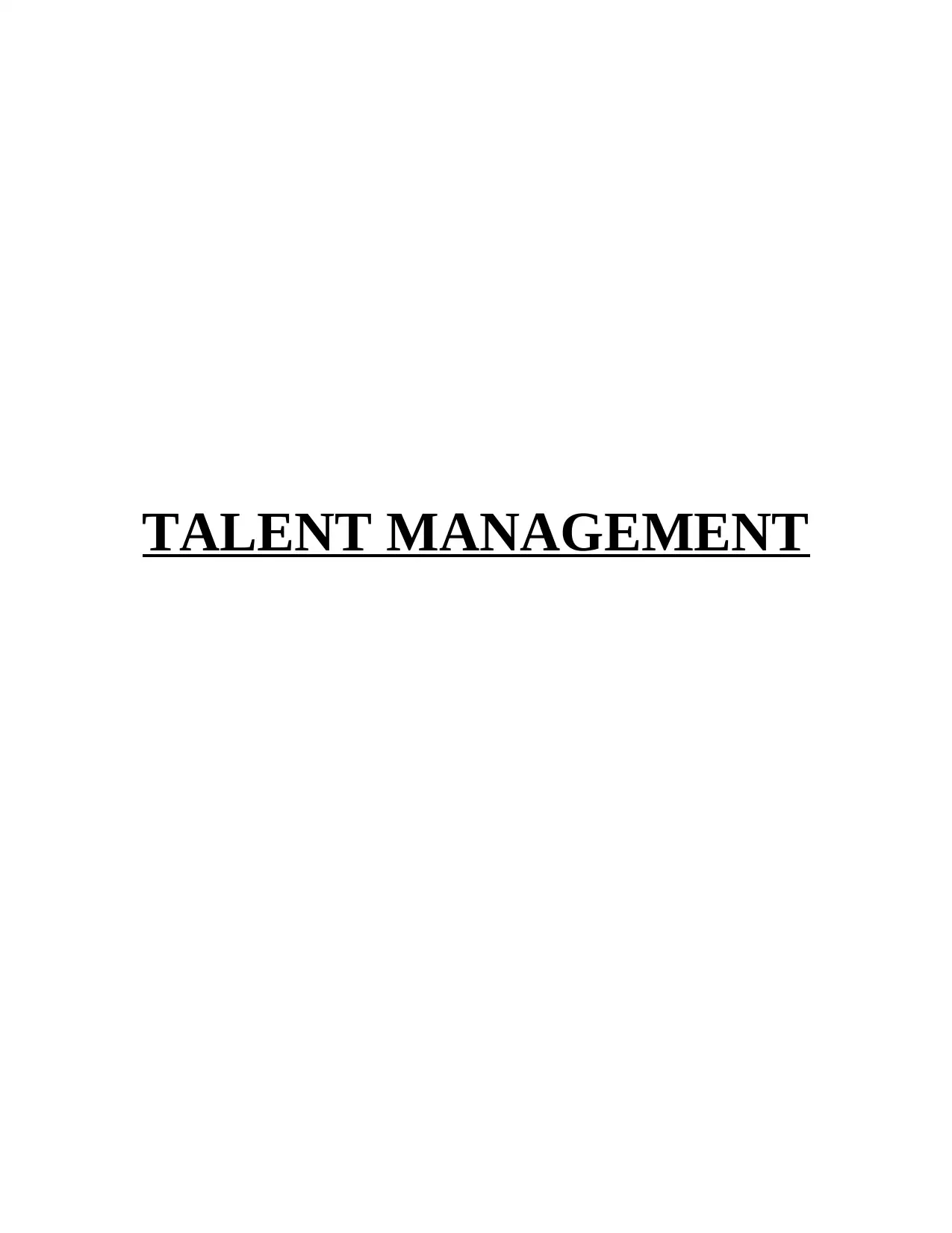
TALENT MANAGEMENT
Secure Best Marks with AI Grader
Need help grading? Try our AI Grader for instant feedback on your assignments.
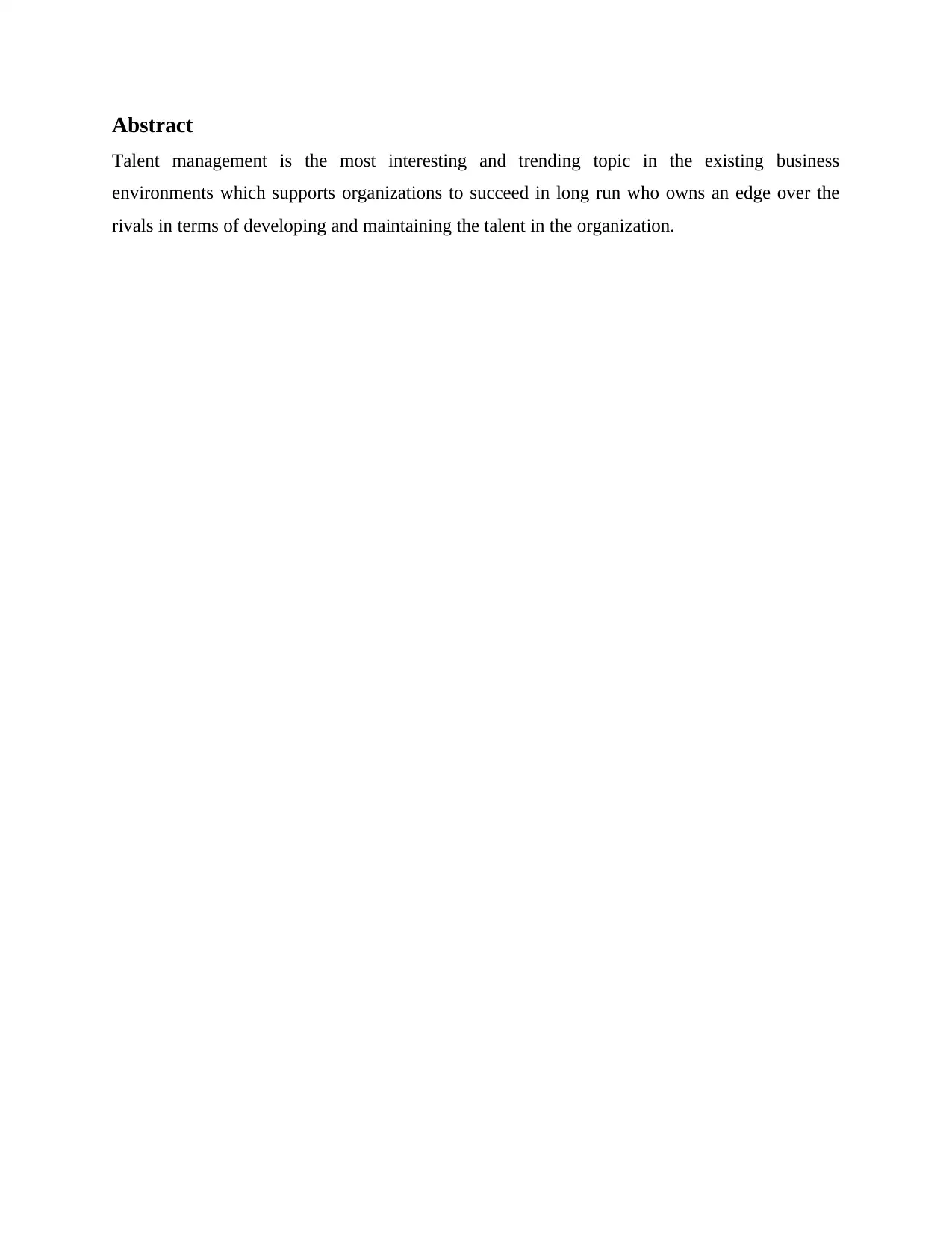
Abstract
Talent management is the most interesting and trending topic in the existing business
environments which supports organizations to succeed in long run who owns an edge over the
rivals in terms of developing and maintaining the talent in the organization.
Talent management is the most interesting and trending topic in the existing business
environments which supports organizations to succeed in long run who owns an edge over the
rivals in terms of developing and maintaining the talent in the organization.
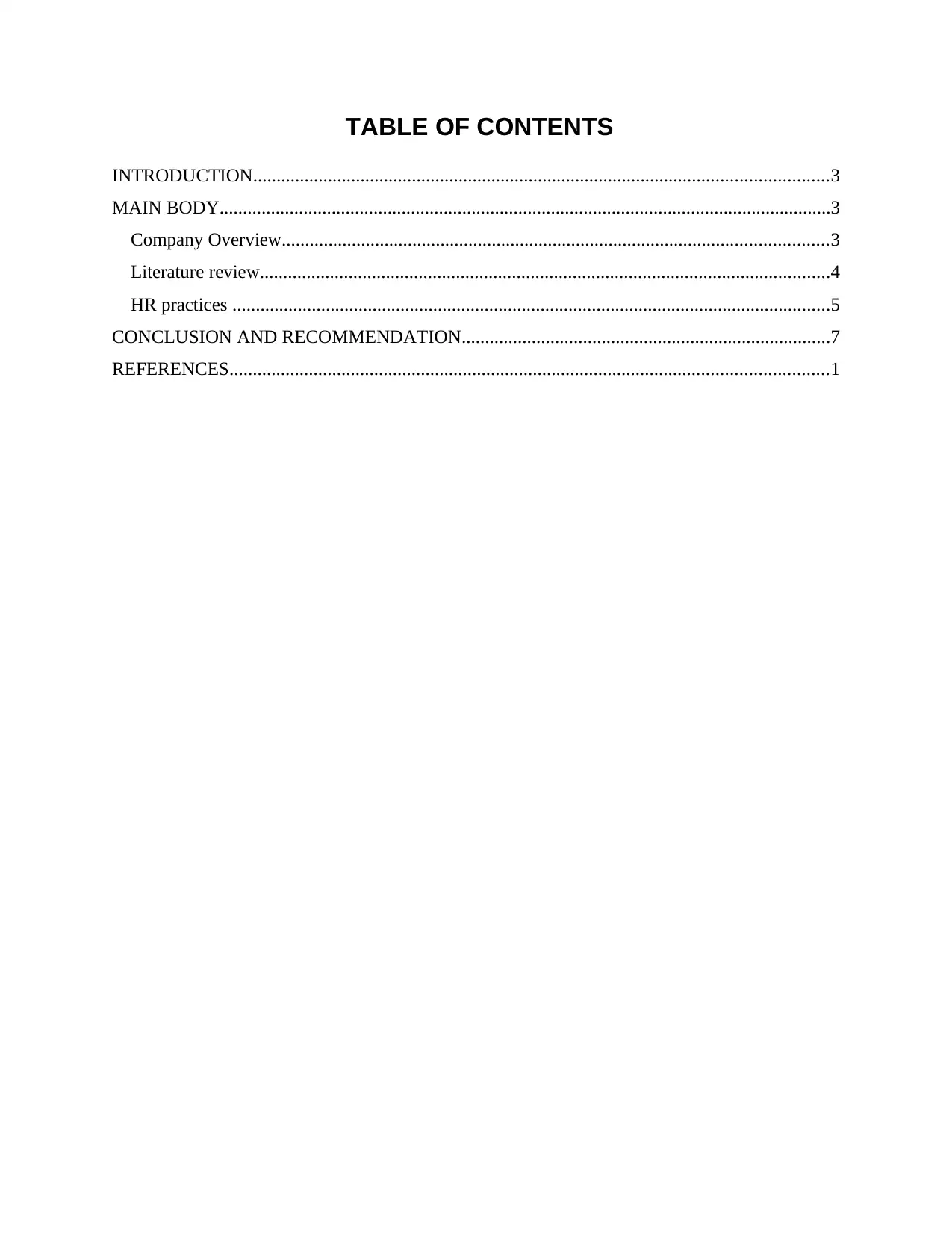
TABLE OF CONTENTS
INTRODUCTION...........................................................................................................................3
MAIN BODY...................................................................................................................................3
Company Overview.....................................................................................................................3
Literature review..........................................................................................................................4
HR practices ................................................................................................................................5
CONCLUSION AND RECOMMENDATION...............................................................................7
REFERENCES................................................................................................................................1
INTRODUCTION...........................................................................................................................3
MAIN BODY...................................................................................................................................3
Company Overview.....................................................................................................................3
Literature review..........................................................................................................................4
HR practices ................................................................................................................................5
CONCLUSION AND RECOMMENDATION...............................................................................7
REFERENCES................................................................................................................................1
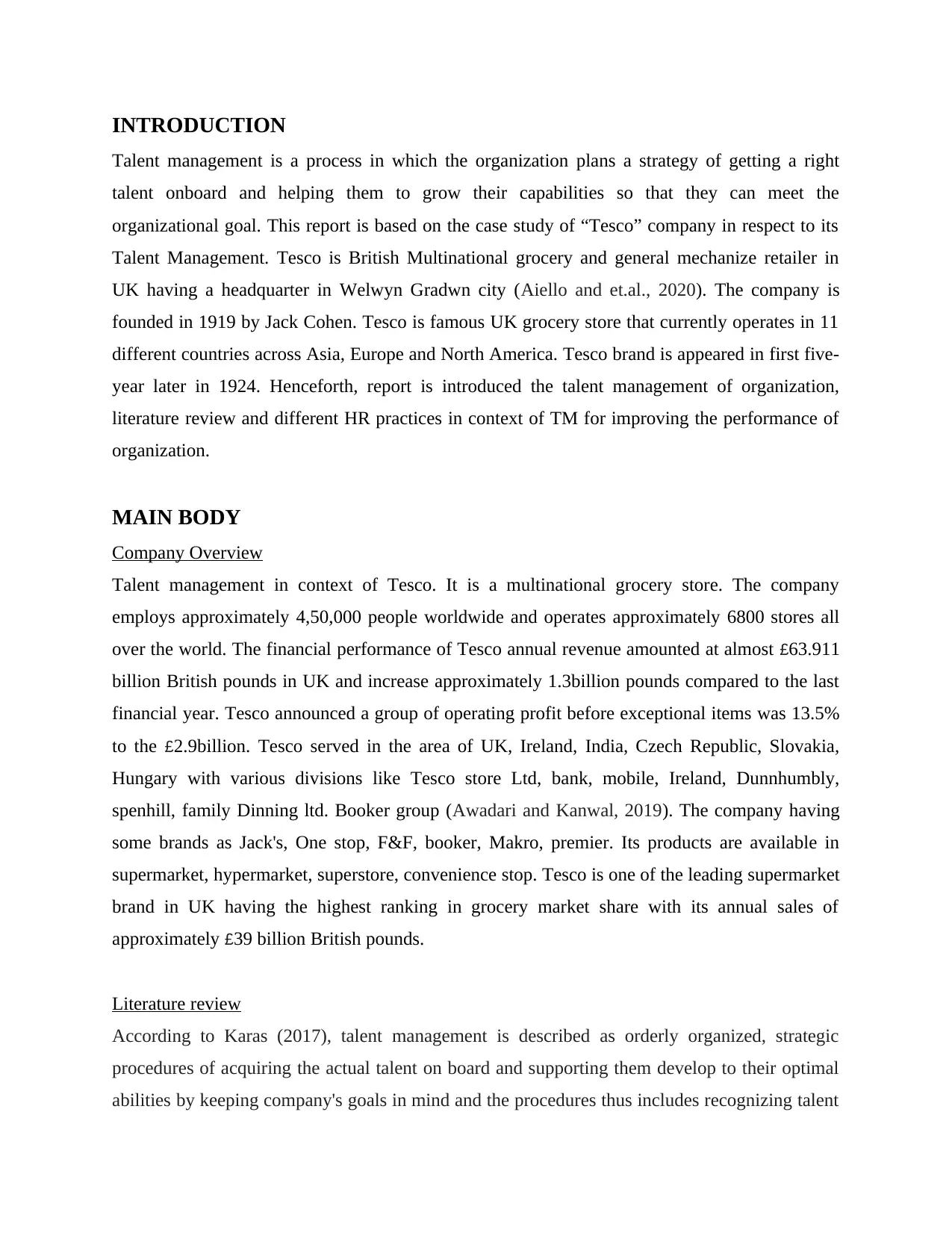
INTRODUCTION
Talent management is a process in which the organization plans a strategy of getting a right
talent onboard and helping them to grow their capabilities so that they can meet the
organizational goal. This report is based on the case study of “Tesco” company in respect to its
Talent Management. Tesco is British Multinational grocery and general mechanize retailer in
UK having a headquarter in Welwyn Gradwn city (Aiello and et.al., 2020). The company is
founded in 1919 by Jack Cohen. Tesco is famous UK grocery store that currently operates in 11
different countries across Asia, Europe and North America. Tesco brand is appeared in first five-
year later in 1924. Henceforth, report is introduced the talent management of organization,
literature review and different HR practices in context of TM for improving the performance of
organization.
MAIN BODY
Company Overview
Talent management in context of Tesco. It is a multinational grocery store. The company
employs approximately 4,50,000 people worldwide and operates approximately 6800 stores all
over the world. The financial performance of Tesco annual revenue amounted at almost £63.911
billion British pounds in UK and increase approximately 1.3billion pounds compared to the last
financial year. Tesco announced a group of operating profit before exceptional items was 13.5%
to the £2.9billion. Tesco served in the area of UK, Ireland, India, Czech Republic, Slovakia,
Hungary with various divisions like Tesco store Ltd, bank, mobile, Ireland, Dunnhumbly,
spenhill, family Dinning ltd. Booker group (Awadari and Kanwal, 2019). The company having
some brands as Jack's, One stop, F&F, booker, Makro, premier. Its products are available in
supermarket, hypermarket, superstore, convenience stop. Tesco is one of the leading supermarket
brand in UK having the highest ranking in grocery market share with its annual sales of
approximately £39 billion British pounds.
Literature review
According to Karas (2017), talent management is described as orderly organized, strategic
procedures of acquiring the actual talent on board and supporting them develop to their optimal
abilities by keeping company's goals in mind and the procedures thus includes recognizing talent
Talent management is a process in which the organization plans a strategy of getting a right
talent onboard and helping them to grow their capabilities so that they can meet the
organizational goal. This report is based on the case study of “Tesco” company in respect to its
Talent Management. Tesco is British Multinational grocery and general mechanize retailer in
UK having a headquarter in Welwyn Gradwn city (Aiello and et.al., 2020). The company is
founded in 1919 by Jack Cohen. Tesco is famous UK grocery store that currently operates in 11
different countries across Asia, Europe and North America. Tesco brand is appeared in first five-
year later in 1924. Henceforth, report is introduced the talent management of organization,
literature review and different HR practices in context of TM for improving the performance of
organization.
MAIN BODY
Company Overview
Talent management in context of Tesco. It is a multinational grocery store. The company
employs approximately 4,50,000 people worldwide and operates approximately 6800 stores all
over the world. The financial performance of Tesco annual revenue amounted at almost £63.911
billion British pounds in UK and increase approximately 1.3billion pounds compared to the last
financial year. Tesco announced a group of operating profit before exceptional items was 13.5%
to the £2.9billion. Tesco served in the area of UK, Ireland, India, Czech Republic, Slovakia,
Hungary with various divisions like Tesco store Ltd, bank, mobile, Ireland, Dunnhumbly,
spenhill, family Dinning ltd. Booker group (Awadari and Kanwal, 2019). The company having
some brands as Jack's, One stop, F&F, booker, Makro, premier. Its products are available in
supermarket, hypermarket, superstore, convenience stop. Tesco is one of the leading supermarket
brand in UK having the highest ranking in grocery market share with its annual sales of
approximately £39 billion British pounds.
Literature review
According to Karas (2017), talent management is described as orderly organized, strategic
procedures of acquiring the actual talent on board and supporting them develop to their optimal
abilities by keeping company's goals in mind and the procedures thus includes recognizing talent
Secure Best Marks with AI Grader
Need help grading? Try our AI Grader for instant feedback on your assignments.
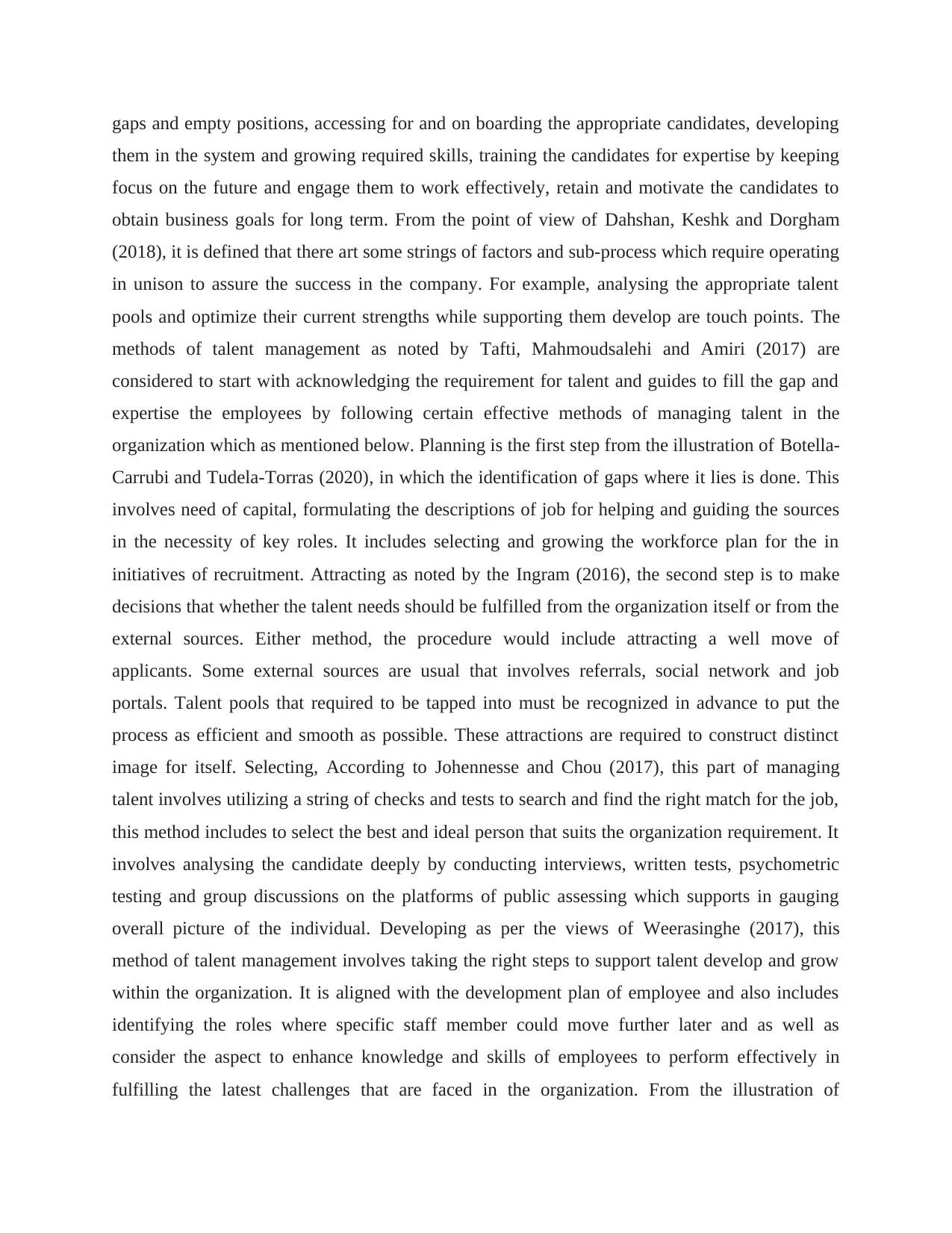
gaps and empty positions, accessing for and on boarding the appropriate candidates, developing
them in the system and growing required skills, training the candidates for expertise by keeping
focus on the future and engage them to work effectively, retain and motivate the candidates to
obtain business goals for long term. From the point of view of Dahshan, Keshk and Dorgham
(2018), it is defined that there art some strings of factors and sub-process which require operating
in unison to assure the success in the company. For example, analysing the appropriate talent
pools and optimize their current strengths while supporting them develop are touch points. The
methods of talent management as noted by Tafti, Mahmoudsalehi and Amiri (2017) are
considered to start with acknowledging the requirement for talent and guides to fill the gap and
expertise the employees by following certain effective methods of managing talent in the
organization which as mentioned below. Planning is the first step from the illustration of Botella-
Carrubi and Tudela-Torras (2020), in which the identification of gaps where it lies is done. This
involves need of capital, formulating the descriptions of job for helping and guiding the sources
in the necessity of key roles. It includes selecting and growing the workforce plan for the in
initiatives of recruitment. Attracting as noted by the Ingram (2016), the second step is to make
decisions that whether the talent needs should be fulfilled from the organization itself or from the
external sources. Either method, the procedure would include attracting a well move of
applicants. Some external sources are usual that involves referrals, social network and job
portals. Talent pools that required to be tapped into must be recognized in advance to put the
process as efficient and smooth as possible. These attractions are required to construct distinct
image for itself. Selecting, According to Johennesse and Chou (2017), this part of managing
talent involves utilizing a string of checks and tests to search and find the right match for the job,
this method includes to select the best and ideal person that suits the organization requirement. It
involves analysing the candidate deeply by conducting interviews, written tests, psychometric
testing and group discussions on the platforms of public assessing which supports in gauging
overall picture of the individual. Developing as per the views of Weerasinghe (2017), this
method of talent management involves taking the right steps to support talent develop and grow
within the organization. It is aligned with the development plan of employee and also includes
identifying the roles where specific staff member could move further later and as well as
consider the aspect to enhance knowledge and skills of employees to perform effectively in
fulfilling the latest challenges that are faced in the organization. From the illustration of
them in the system and growing required skills, training the candidates for expertise by keeping
focus on the future and engage them to work effectively, retain and motivate the candidates to
obtain business goals for long term. From the point of view of Dahshan, Keshk and Dorgham
(2018), it is defined that there art some strings of factors and sub-process which require operating
in unison to assure the success in the company. For example, analysing the appropriate talent
pools and optimize their current strengths while supporting them develop are touch points. The
methods of talent management as noted by Tafti, Mahmoudsalehi and Amiri (2017) are
considered to start with acknowledging the requirement for talent and guides to fill the gap and
expertise the employees by following certain effective methods of managing talent in the
organization which as mentioned below. Planning is the first step from the illustration of Botella-
Carrubi and Tudela-Torras (2020), in which the identification of gaps where it lies is done. This
involves need of capital, formulating the descriptions of job for helping and guiding the sources
in the necessity of key roles. It includes selecting and growing the workforce plan for the in
initiatives of recruitment. Attracting as noted by the Ingram (2016), the second step is to make
decisions that whether the talent needs should be fulfilled from the organization itself or from the
external sources. Either method, the procedure would include attracting a well move of
applicants. Some external sources are usual that involves referrals, social network and job
portals. Talent pools that required to be tapped into must be recognized in advance to put the
process as efficient and smooth as possible. These attractions are required to construct distinct
image for itself. Selecting, According to Johennesse and Chou (2017), this part of managing
talent involves utilizing a string of checks and tests to search and find the right match for the job,
this method includes to select the best and ideal person that suits the organization requirement. It
involves analysing the candidate deeply by conducting interviews, written tests, psychometric
testing and group discussions on the platforms of public assessing which supports in gauging
overall picture of the individual. Developing as per the views of Weerasinghe (2017), this
method of talent management involves taking the right steps to support talent develop and grow
within the organization. It is aligned with the development plan of employee and also includes
identifying the roles where specific staff member could move further later and as well as
consider the aspect to enhance knowledge and skills of employees to perform effectively in
fulfilling the latest challenges that are faced in the organization. From the illustration of
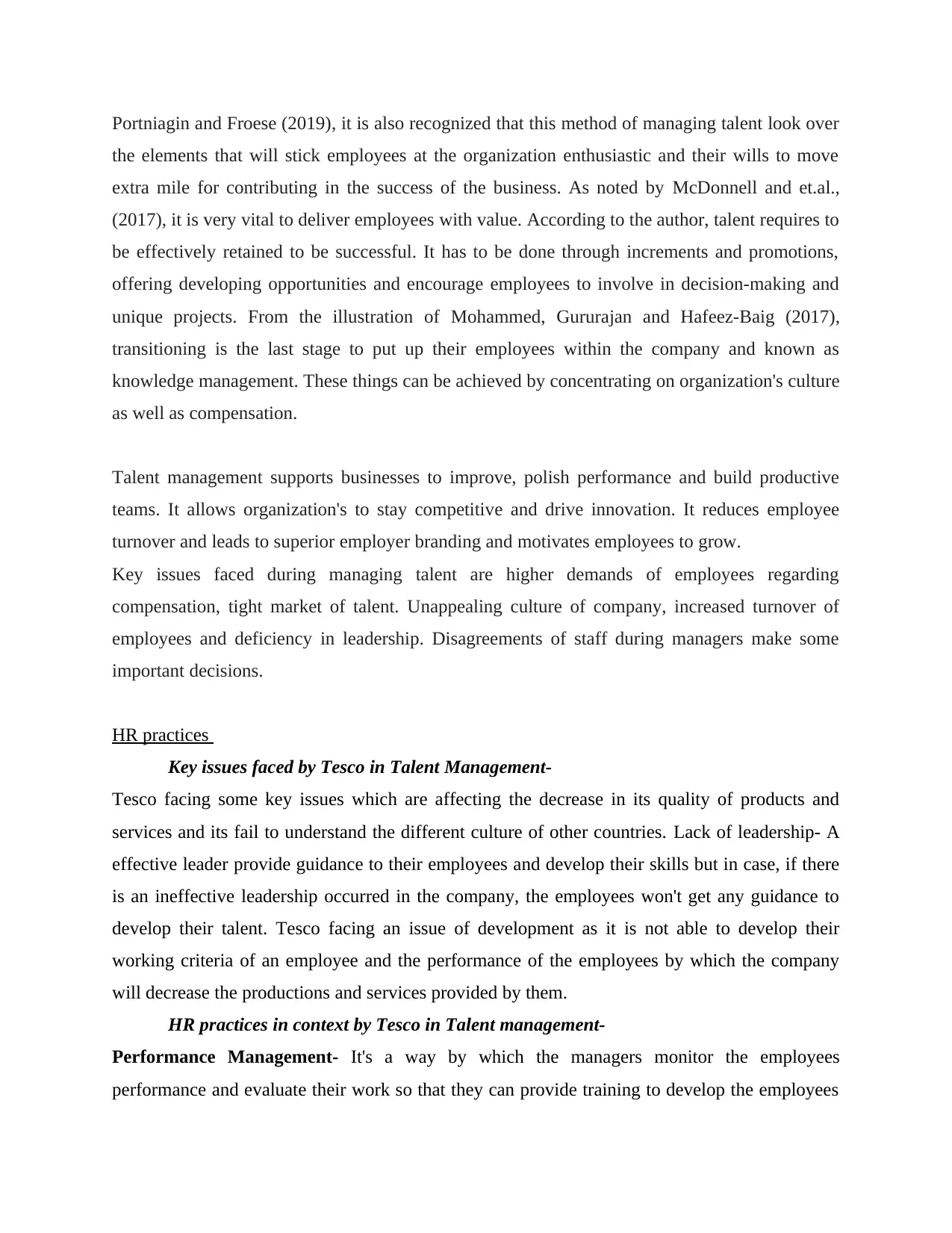
Portniagin and Froese (2019), it is also recognized that this method of managing talent look over
the elements that will stick employees at the organization enthusiastic and their wills to move
extra mile for contributing in the success of the business. As noted by McDonnell and et.al.,
(2017), it is very vital to deliver employees with value. According to the author, talent requires to
be effectively retained to be successful. It has to be done through increments and promotions,
offering developing opportunities and encourage employees to involve in decision-making and
unique projects. From the illustration of Mohammed, Gururajan and Hafeez-Baig (2017),
transitioning is the last stage to put up their employees within the company and known as
knowledge management. These things can be achieved by concentrating on organization's culture
as well as compensation.
Talent management supports businesses to improve, polish performance and build productive
teams. It allows organization's to stay competitive and drive innovation. It reduces employee
turnover and leads to superior employer branding and motivates employees to grow.
Key issues faced during managing talent are higher demands of employees regarding
compensation, tight market of talent. Unappealing culture of company, increased turnover of
employees and deficiency in leadership. Disagreements of staff during managers make some
important decisions.
HR practices
Key issues faced by Tesco in Talent Management-
Tesco facing some key issues which are affecting the decrease in its quality of products and
services and its fail to understand the different culture of other countries. Lack of leadership- A
effective leader provide guidance to their employees and develop their skills but in case, if there
is an ineffective leadership occurred in the company, the employees won't get any guidance to
develop their talent. Tesco facing an issue of development as it is not able to develop their
working criteria of an employee and the performance of the employees by which the company
will decrease the productions and services provided by them.
HR practices in context by Tesco in Talent management-
Performance Management- It's a way by which the managers monitor the employees
performance and evaluate their work so that they can provide training to develop the employees
the elements that will stick employees at the organization enthusiastic and their wills to move
extra mile for contributing in the success of the business. As noted by McDonnell and et.al.,
(2017), it is very vital to deliver employees with value. According to the author, talent requires to
be effectively retained to be successful. It has to be done through increments and promotions,
offering developing opportunities and encourage employees to involve in decision-making and
unique projects. From the illustration of Mohammed, Gururajan and Hafeez-Baig (2017),
transitioning is the last stage to put up their employees within the company and known as
knowledge management. These things can be achieved by concentrating on organization's culture
as well as compensation.
Talent management supports businesses to improve, polish performance and build productive
teams. It allows organization's to stay competitive and drive innovation. It reduces employee
turnover and leads to superior employer branding and motivates employees to grow.
Key issues faced during managing talent are higher demands of employees regarding
compensation, tight market of talent. Unappealing culture of company, increased turnover of
employees and deficiency in leadership. Disagreements of staff during managers make some
important decisions.
HR practices
Key issues faced by Tesco in Talent Management-
Tesco facing some key issues which are affecting the decrease in its quality of products and
services and its fail to understand the different culture of other countries. Lack of leadership- A
effective leader provide guidance to their employees and develop their skills but in case, if there
is an ineffective leadership occurred in the company, the employees won't get any guidance to
develop their talent. Tesco facing an issue of development as it is not able to develop their
working criteria of an employee and the performance of the employees by which the company
will decrease the productions and services provided by them.
HR practices in context by Tesco in Talent management-
Performance Management- It's a way by which the managers monitor the employees
performance and evaluate their work so that they can provide training to develop the employees
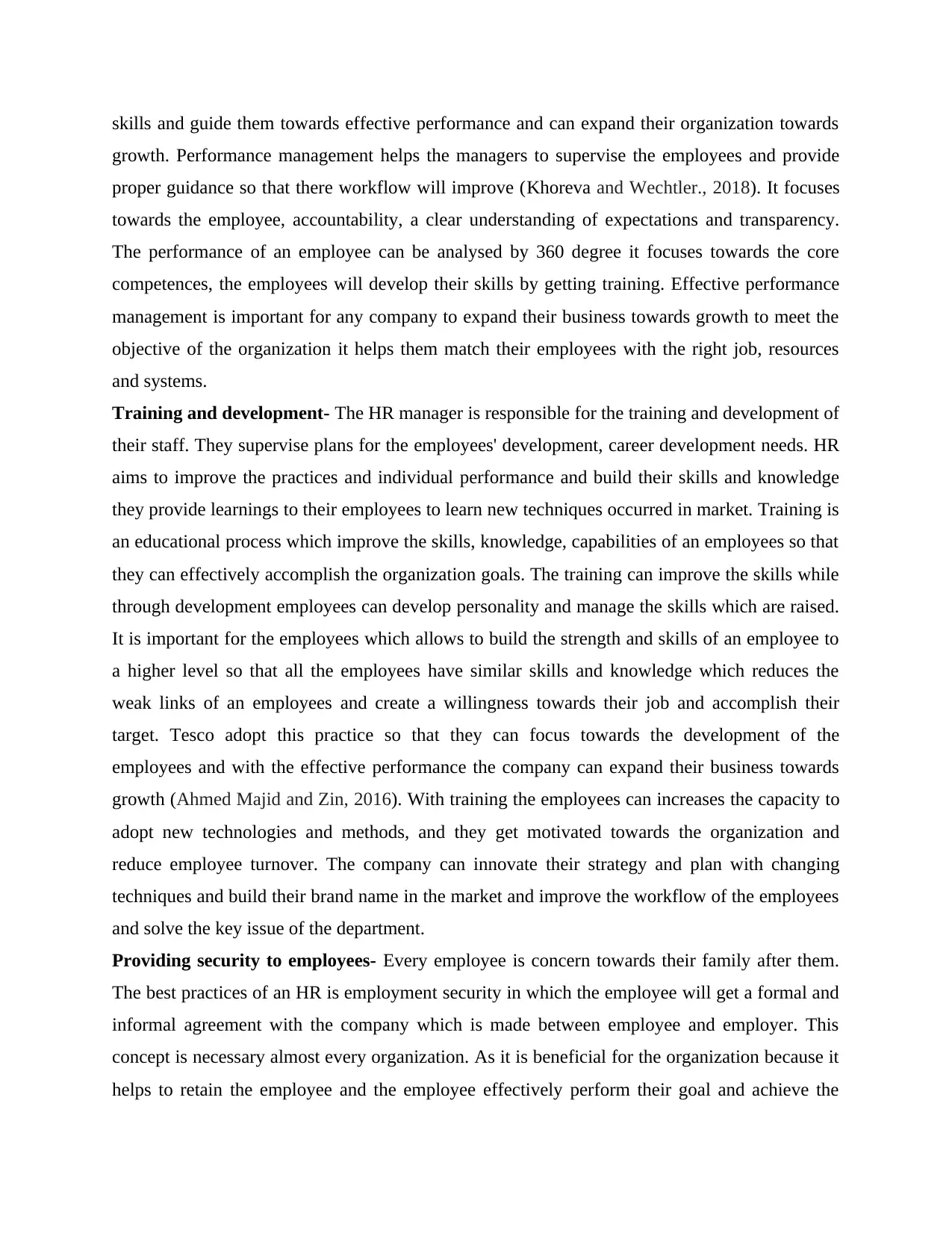
skills and guide them towards effective performance and can expand their organization towards
growth. Performance management helps the managers to supervise the employees and provide
proper guidance so that there workflow will improve (Khoreva and Wechtler., 2018). It focuses
towards the employee, accountability, a clear understanding of expectations and transparency.
The performance of an employee can be analysed by 360 degree it focuses towards the core
competences, the employees will develop their skills by getting training. Effective performance
management is important for any company to expand their business towards growth to meet the
objective of the organization it helps them match their employees with the right job, resources
and systems.
Training and development- The HR manager is responsible for the training and development of
their staff. They supervise plans for the employees' development, career development needs. HR
aims to improve the practices and individual performance and build their skills and knowledge
they provide learnings to their employees to learn new techniques occurred in market. Training is
an educational process which improve the skills, knowledge, capabilities of an employees so that
they can effectively accomplish the organization goals. The training can improve the skills while
through development employees can develop personality and manage the skills which are raised.
It is important for the employees which allows to build the strength and skills of an employee to
a higher level so that all the employees have similar skills and knowledge which reduces the
weak links of an employees and create a willingness towards their job and accomplish their
target. Tesco adopt this practice so that they can focus towards the development of the
employees and with the effective performance the company can expand their business towards
growth (Ahmed Majid and Zin, 2016). With training the employees can increases the capacity to
adopt new technologies and methods, and they get motivated towards the organization and
reduce employee turnover. The company can innovate their strategy and plan with changing
techniques and build their brand name in the market and improve the workflow of the employees
and solve the key issue of the department.
Providing security to employees- Every employee is concern towards their family after them.
The best practices of an HR is employment security in which the employee will get a formal and
informal agreement with the company which is made between employee and employer. This
concept is necessary almost every organization. As it is beneficial for the organization because it
helps to retain the employee and the employee effectively perform their goal and achieve the
growth. Performance management helps the managers to supervise the employees and provide
proper guidance so that there workflow will improve (Khoreva and Wechtler., 2018). It focuses
towards the employee, accountability, a clear understanding of expectations and transparency.
The performance of an employee can be analysed by 360 degree it focuses towards the core
competences, the employees will develop their skills by getting training. Effective performance
management is important for any company to expand their business towards growth to meet the
objective of the organization it helps them match their employees with the right job, resources
and systems.
Training and development- The HR manager is responsible for the training and development of
their staff. They supervise plans for the employees' development, career development needs. HR
aims to improve the practices and individual performance and build their skills and knowledge
they provide learnings to their employees to learn new techniques occurred in market. Training is
an educational process which improve the skills, knowledge, capabilities of an employees so that
they can effectively accomplish the organization goals. The training can improve the skills while
through development employees can develop personality and manage the skills which are raised.
It is important for the employees which allows to build the strength and skills of an employee to
a higher level so that all the employees have similar skills and knowledge which reduces the
weak links of an employees and create a willingness towards their job and accomplish their
target. Tesco adopt this practice so that they can focus towards the development of the
employees and with the effective performance the company can expand their business towards
growth (Ahmed Majid and Zin, 2016). With training the employees can increases the capacity to
adopt new technologies and methods, and they get motivated towards the organization and
reduce employee turnover. The company can innovate their strategy and plan with changing
techniques and build their brand name in the market and improve the workflow of the employees
and solve the key issue of the department.
Providing security to employees- Every employee is concern towards their family after them.
The best practices of an HR is employment security in which the employee will get a formal and
informal agreement with the company which is made between employee and employer. This
concept is necessary almost every organization. As it is beneficial for the organization because it
helps to retain the employee and the employee effectively perform their goal and achieve the
Paraphrase This Document
Need a fresh take? Get an instant paraphrase of this document with our AI Paraphraser
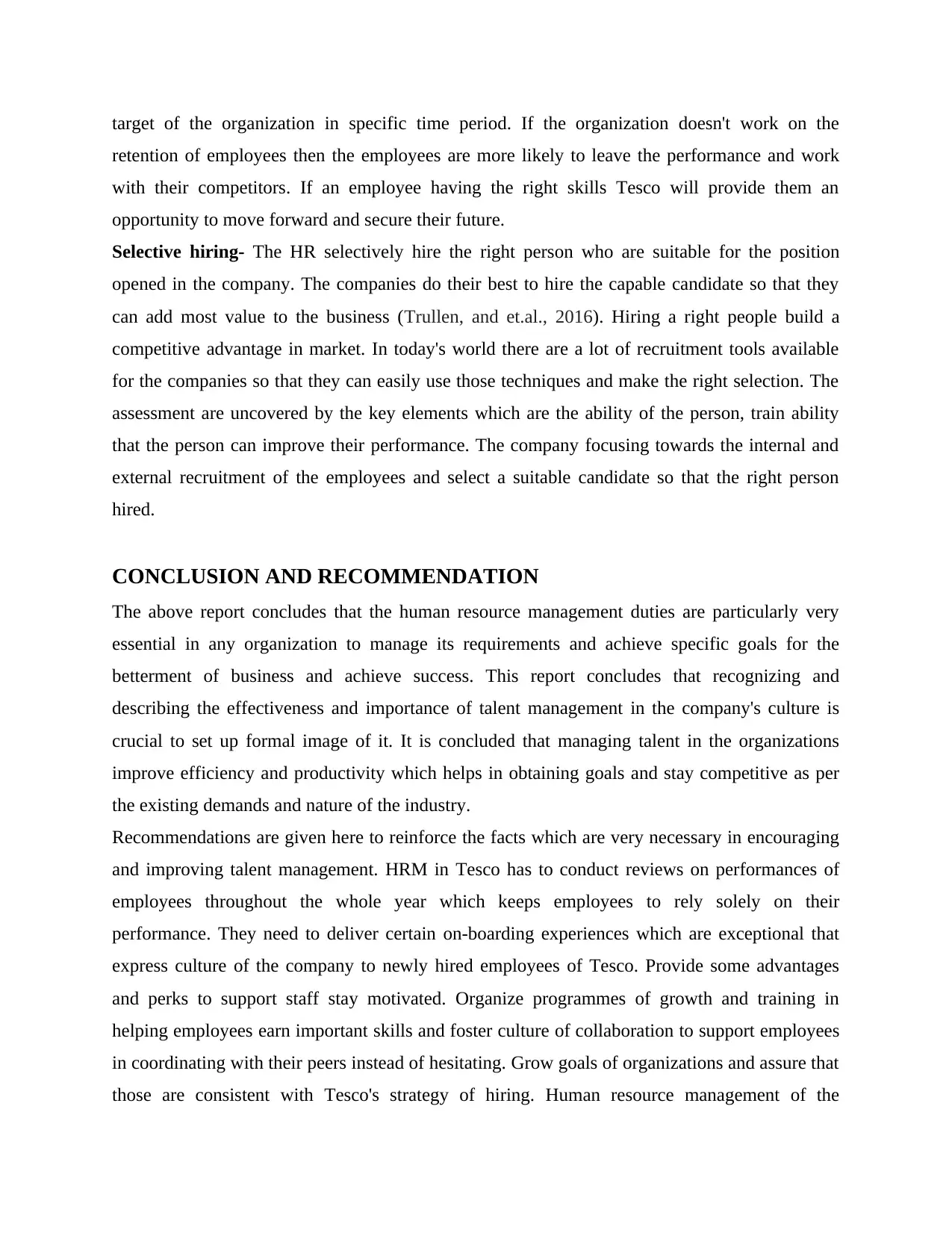
target of the organization in specific time period. If the organization doesn't work on the
retention of employees then the employees are more likely to leave the performance and work
with their competitors. If an employee having the right skills Tesco will provide them an
opportunity to move forward and secure their future.
Selective hiring- The HR selectively hire the right person who are suitable for the position
opened in the company. The companies do their best to hire the capable candidate so that they
can add most value to the business (Trullen, and et.al., 2016). Hiring a right people build a
competitive advantage in market. In today's world there are a lot of recruitment tools available
for the companies so that they can easily use those techniques and make the right selection. The
assessment are uncovered by the key elements which are the ability of the person, train ability
that the person can improve their performance. The company focusing towards the internal and
external recruitment of the employees and select a suitable candidate so that the right person
hired.
CONCLUSION AND RECOMMENDATION
The above report concludes that the human resource management duties are particularly very
essential in any organization to manage its requirements and achieve specific goals for the
betterment of business and achieve success. This report concludes that recognizing and
describing the effectiveness and importance of talent management in the company's culture is
crucial to set up formal image of it. It is concluded that managing talent in the organizations
improve efficiency and productivity which helps in obtaining goals and stay competitive as per
the existing demands and nature of the industry.
Recommendations are given here to reinforce the facts which are very necessary in encouraging
and improving talent management. HRM in Tesco has to conduct reviews on performances of
employees throughout the whole year which keeps employees to rely solely on their
performance. They need to deliver certain on-boarding experiences which are exceptional that
express culture of the company to newly hired employees of Tesco. Provide some advantages
and perks to support staff stay motivated. Organize programmes of growth and training in
helping employees earn important skills and foster culture of collaboration to support employees
in coordinating with their peers instead of hesitating. Grow goals of organizations and assure that
those are consistent with Tesco's strategy of hiring. Human resource management of the
retention of employees then the employees are more likely to leave the performance and work
with their competitors. If an employee having the right skills Tesco will provide them an
opportunity to move forward and secure their future.
Selective hiring- The HR selectively hire the right person who are suitable for the position
opened in the company. The companies do their best to hire the capable candidate so that they
can add most value to the business (Trullen, and et.al., 2016). Hiring a right people build a
competitive advantage in market. In today's world there are a lot of recruitment tools available
for the companies so that they can easily use those techniques and make the right selection. The
assessment are uncovered by the key elements which are the ability of the person, train ability
that the person can improve their performance. The company focusing towards the internal and
external recruitment of the employees and select a suitable candidate so that the right person
hired.
CONCLUSION AND RECOMMENDATION
The above report concludes that the human resource management duties are particularly very
essential in any organization to manage its requirements and achieve specific goals for the
betterment of business and achieve success. This report concludes that recognizing and
describing the effectiveness and importance of talent management in the company's culture is
crucial to set up formal image of it. It is concluded that managing talent in the organizations
improve efficiency and productivity which helps in obtaining goals and stay competitive as per
the existing demands and nature of the industry.
Recommendations are given here to reinforce the facts which are very necessary in encouraging
and improving talent management. HRM in Tesco has to conduct reviews on performances of
employees throughout the whole year which keeps employees to rely solely on their
performance. They need to deliver certain on-boarding experiences which are exceptional that
express culture of the company to newly hired employees of Tesco. Provide some advantages
and perks to support staff stay motivated. Organize programmes of growth and training in
helping employees earn important skills and foster culture of collaboration to support employees
in coordinating with their peers instead of hesitating. Grow goals of organizations and assure that
those are consistent with Tesco's strategy of hiring. Human resource management of the
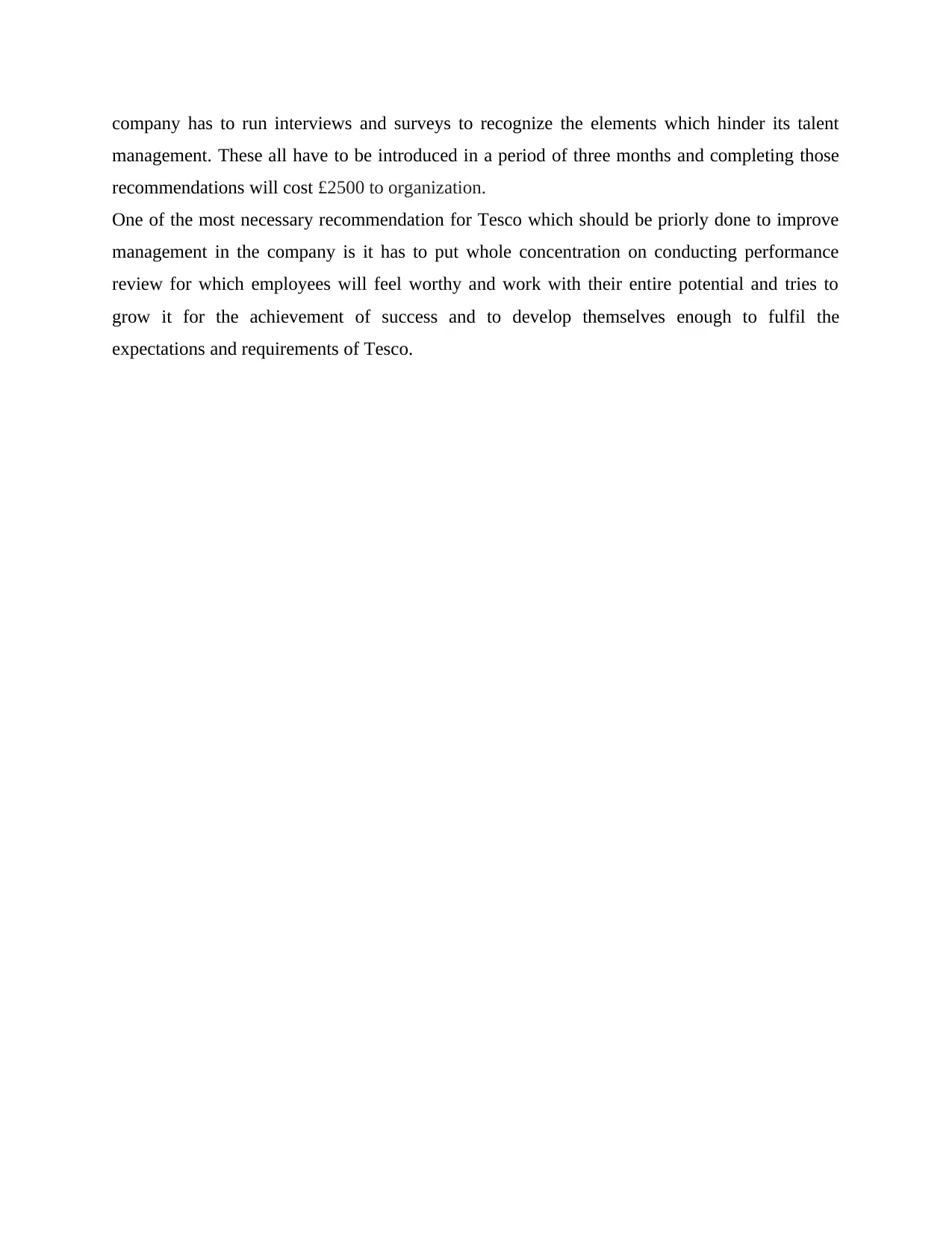
company has to run interviews and surveys to recognize the elements which hinder its talent
management. These all have to be introduced in a period of three months and completing those
recommendations will cost £2500 to organization.
One of the most necessary recommendation for Tesco which should be priorly done to improve
management in the company is it has to put whole concentration on conducting performance
review for which employees will feel worthy and work with their entire potential and tries to
grow it for the achievement of success and to develop themselves enough to fulfil the
expectations and requirements of Tesco.
management. These all have to be introduced in a period of three months and completing those
recommendations will cost £2500 to organization.
One of the most necessary recommendation for Tesco which should be priorly done to improve
management in the company is it has to put whole concentration on conducting performance
review for which employees will feel worthy and work with their entire potential and tries to
grow it for the achievement of success and to develop themselves enough to fulfil the
expectations and requirements of Tesco.
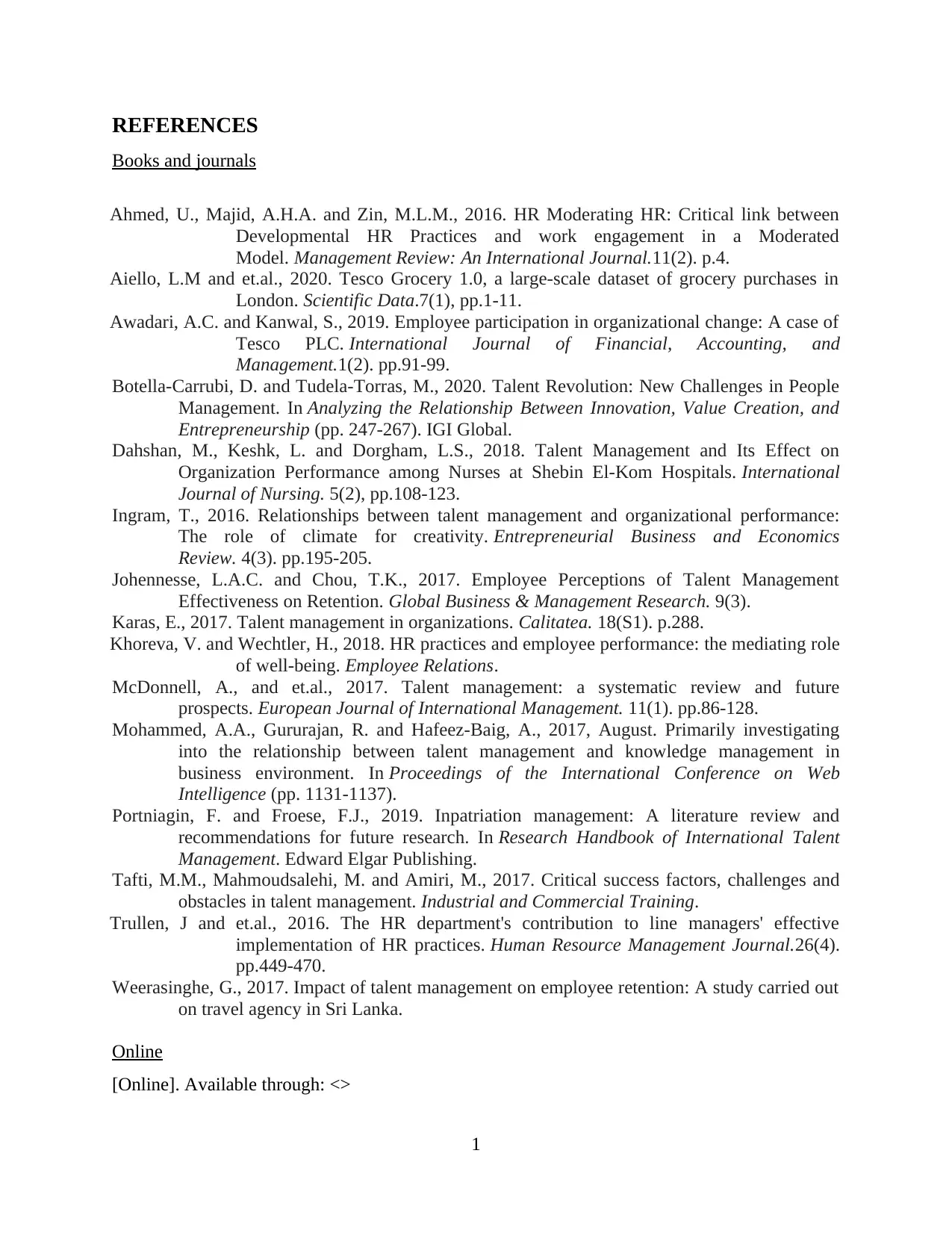
REFERENCES
Books and journals
Ahmed, U., Majid, A.H.A. and Zin, M.L.M., 2016. HR Moderating HR: Critical link between
Developmental HR Practices and work engagement in a Moderated
Model. Management Review: An International Journal.11(2). p.4.
Aiello, L.M and et.al., 2020. Tesco Grocery 1.0, a large-scale dataset of grocery purchases in
London. Scientific Data.7(1), pp.1-11.
Awadari, A.C. and Kanwal, S., 2019. Employee participation in organizational change: A case of
Tesco PLC. International Journal of Financial, Accounting, and
Management.1(2). pp.91-99.
Botella-Carrubi, D. and Tudela-Torras, M., 2020. Talent Revolution: New Challenges in People
Management. In Analyzing the Relationship Between Innovation, Value Creation, and
Entrepreneurship (pp. 247-267). IGI Global.
Dahshan, M., Keshk, L. and Dorgham, L.S., 2018. Talent Management and Its Effect on
Organization Performance among Nurses at Shebin El-Kom Hospitals. International
Journal of Nursing. 5(2), pp.108-123.
Ingram, T., 2016. Relationships between talent management and organizational performance:
The role of climate for creativity. Entrepreneurial Business and Economics
Review. 4(3). pp.195-205.
Johennesse, L.A.C. and Chou, T.K., 2017. Employee Perceptions of Talent Management
Effectiveness on Retention. Global Business & Management Research. 9(3).
Karas, E., 2017. Talent management in organizations. Calitatea. 18(S1). p.288.
Khoreva, V. and Wechtler, H., 2018. HR practices and employee performance: the mediating role
of well-being. Employee Relations.
McDonnell, A., and et.al., 2017. Talent management: a systematic review and future
prospects. European Journal of International Management. 11(1). pp.86-128.
Mohammed, A.A., Gururajan, R. and Hafeez-Baig, A., 2017, August. Primarily investigating
into the relationship between talent management and knowledge management in
business environment. In Proceedings of the International Conference on Web
Intelligence (pp. 1131-1137).
Portniagin, F. and Froese, F.J., 2019. Inpatriation management: A literature review and
recommendations for future research. In Research Handbook of International Talent
Management. Edward Elgar Publishing.
Tafti, M.M., Mahmoudsalehi, M. and Amiri, M., 2017. Critical success factors, challenges and
obstacles in talent management. Industrial and Commercial Training.
Trullen, J and et.al., 2016. The HR department's contribution to line managers' effective
implementation of HR practices. Human Resource Management Journal.26(4).
pp.449-470.
Weerasinghe, G., 2017. Impact of talent management on employee retention: A study carried out
on travel agency in Sri Lanka.
Online
[Online]. Available through: <>
1
Books and journals
Ahmed, U., Majid, A.H.A. and Zin, M.L.M., 2016. HR Moderating HR: Critical link between
Developmental HR Practices and work engagement in a Moderated
Model. Management Review: An International Journal.11(2). p.4.
Aiello, L.M and et.al., 2020. Tesco Grocery 1.0, a large-scale dataset of grocery purchases in
London. Scientific Data.7(1), pp.1-11.
Awadari, A.C. and Kanwal, S., 2019. Employee participation in organizational change: A case of
Tesco PLC. International Journal of Financial, Accounting, and
Management.1(2). pp.91-99.
Botella-Carrubi, D. and Tudela-Torras, M., 2020. Talent Revolution: New Challenges in People
Management. In Analyzing the Relationship Between Innovation, Value Creation, and
Entrepreneurship (pp. 247-267). IGI Global.
Dahshan, M., Keshk, L. and Dorgham, L.S., 2018. Talent Management and Its Effect on
Organization Performance among Nurses at Shebin El-Kom Hospitals. International
Journal of Nursing. 5(2), pp.108-123.
Ingram, T., 2016. Relationships between talent management and organizational performance:
The role of climate for creativity. Entrepreneurial Business and Economics
Review. 4(3). pp.195-205.
Johennesse, L.A.C. and Chou, T.K., 2017. Employee Perceptions of Talent Management
Effectiveness on Retention. Global Business & Management Research. 9(3).
Karas, E., 2017. Talent management in organizations. Calitatea. 18(S1). p.288.
Khoreva, V. and Wechtler, H., 2018. HR practices and employee performance: the mediating role
of well-being. Employee Relations.
McDonnell, A., and et.al., 2017. Talent management: a systematic review and future
prospects. European Journal of International Management. 11(1). pp.86-128.
Mohammed, A.A., Gururajan, R. and Hafeez-Baig, A., 2017, August. Primarily investigating
into the relationship between talent management and knowledge management in
business environment. In Proceedings of the International Conference on Web
Intelligence (pp. 1131-1137).
Portniagin, F. and Froese, F.J., 2019. Inpatriation management: A literature review and
recommendations for future research. In Research Handbook of International Talent
Management. Edward Elgar Publishing.
Tafti, M.M., Mahmoudsalehi, M. and Amiri, M., 2017. Critical success factors, challenges and
obstacles in talent management. Industrial and Commercial Training.
Trullen, J and et.al., 2016. The HR department's contribution to line managers' effective
implementation of HR practices. Human Resource Management Journal.26(4).
pp.449-470.
Weerasinghe, G., 2017. Impact of talent management on employee retention: A study carried out
on travel agency in Sri Lanka.
Online
[Online]. Available through: <>
1
Secure Best Marks with AI Grader
Need help grading? Try our AI Grader for instant feedback on your assignments.

2
1 out of 11
Your All-in-One AI-Powered Toolkit for Academic Success.
+13062052269
info@desklib.com
Available 24*7 on WhatsApp / Email
![[object Object]](/_next/static/media/star-bottom.7253800d.svg)
Unlock your academic potential
© 2024 | Zucol Services PVT LTD | All rights reserved.




